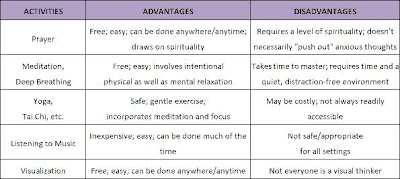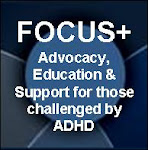In order to help encourage more online discussion about the four basic steps for managing ADHD that we discussed at our
8/10/10 meeting, I'm creating separate blog entries for each of them, focusing on each specific topic and elaborating a little bit. Hopefully this is helpful for the group.

About a year ago I helped to update the FOCUS+ web site and in response to suggestions from a few group members, we added a "New to ADHD? Start Here." page where first-timers could start to "get their bearings" as they began to explore how to more effectively manage living with ADHD themselves, or living with a loved one who had ADHD.
The first step I listed was "Relax." In the context that I was writing at the time, I just wanted to remind people that they weren't facing some new crisis -- If someone has ADHD, they were born with it. The only real change was that now with a diagnosis of ADHD they were in a better position to try things to manage their ADHD symptoms.
However, at our August 2010 FOCUS+ meeting, the notion of "Relax" was revisited in a different context. We all know that when a person is physically and mentally calm and relaxed, they are more perceptive, more effective critical thinkers and more creative...in short, they think and function far better than when they're in a stressed, "fight or flight" state. (Don't believe me? Check out these articles: Rational Positive Thinking, The Relaxation Response: reducing stress and improving cognition in healthy aging adults), Relaxation Techniques to Reduce ADD Symptoms)
As I took notes at our meeting, I saw a "continuum" of relaxation techniques ranging from what might be called "soft" or "passive techniques such as visualization or meditation to "hard" or "active" techniques like engaging in high-effort, high-risk athletic activities such as martial arts. Which ones work best for each of us depends on a lot of things, obviously -- our general temperments and outlooks on life, our physical health, how much time we have to explore these things, etc.
Some of the "passive" techniques we discussed included: prayer, visualization, meditation and quite activities like painting. "Passive" probably isn't the best word for these activities as they require effort and focus, but relative to other options we discussed, they're more quiet, tranquil and mental in nature as opposed to active and physical.


The "active" techniques we discussed included high-concentration and/or high-effort/high-risk activities like mountain biking and martial arts. The common theme among these activities is that they require a person to totally live in the moment and (therefore) let go of any anxiety-producing thoughts. Mountain-biking down a steep, narrow, rocky trail at high speed is the absolute wrong time to start ruminating about how much you're struggling at work; that lapse in concentration will probably result in you crashing your bike and getting hurt! Even "active" activities without the danger element such as golf, yoga and playing an instrument still require one's full focus to perform well, which at least temporarily forces a person to live in the moment and push out any other distracting thoughts.


Here are some questions to weigh in on with your experience:
- Do you tend to have the best results from the "soft" types of relaxation techniques or the more "active" ones? Why?
- Do you have any personal relaxation techniques not listed here that
you'd recommend? Cross-stitching? Fly fishing? Writing annoyingly long and poorly laid out blog entries with gratuitous graphics inserted in them?
- Do you notice the difference in how well you manage your ADHD symptoms
between when you're anxious/stressed/wound up and when you're physically and mentally calm?
(Want to add your comment but not 100% sure how? It's easy! Click here for a super-quick tutorial.)
 Effective today, 12/18/2010, the URL for FOCUS+ is now http://www.focus-plus.org/ (note the additional hyphen between focus and plus).
Effective today, 12/18/2010, the URL for FOCUS+ is now http://www.focus-plus.org/ (note the additional hyphen between focus and plus).

















































